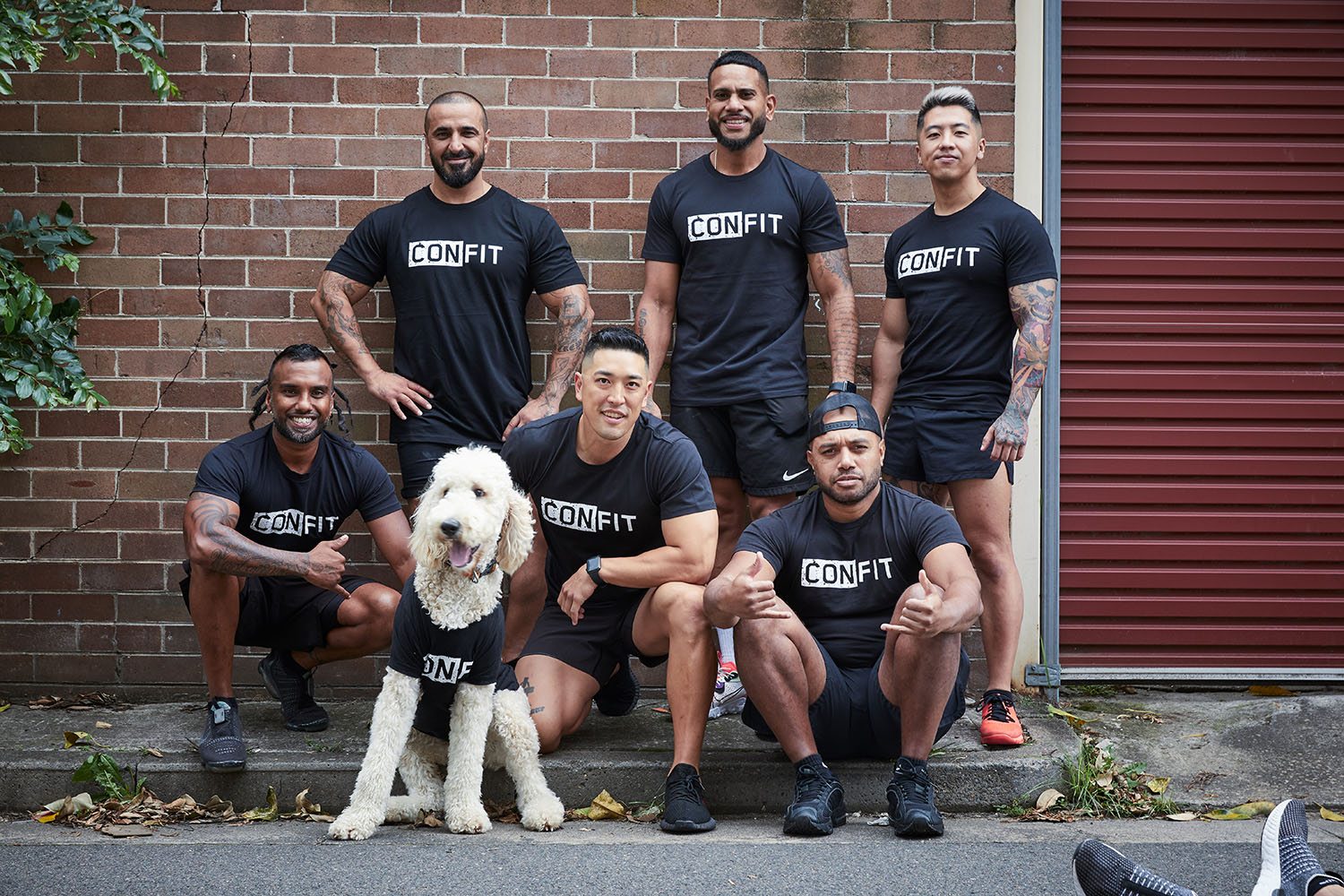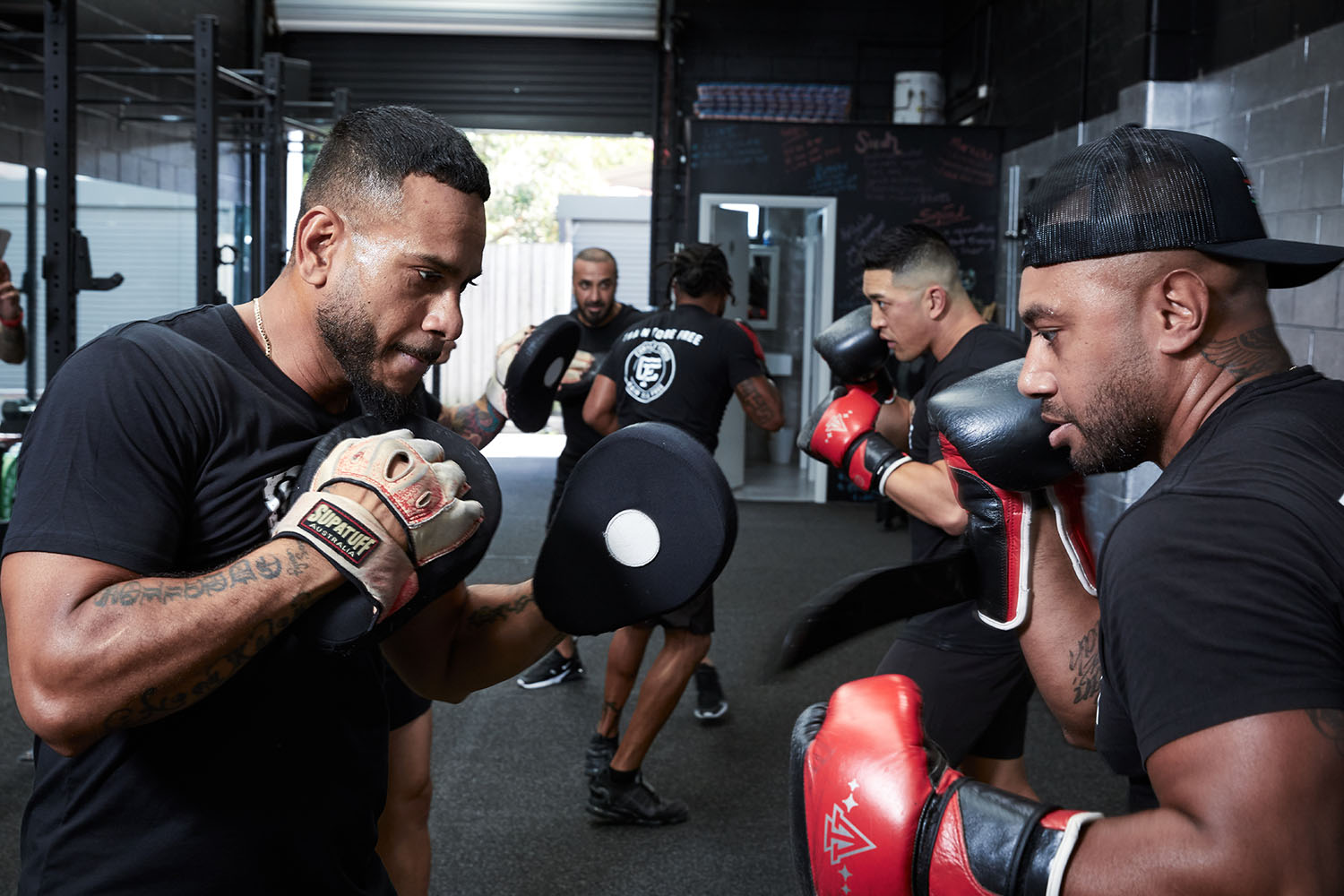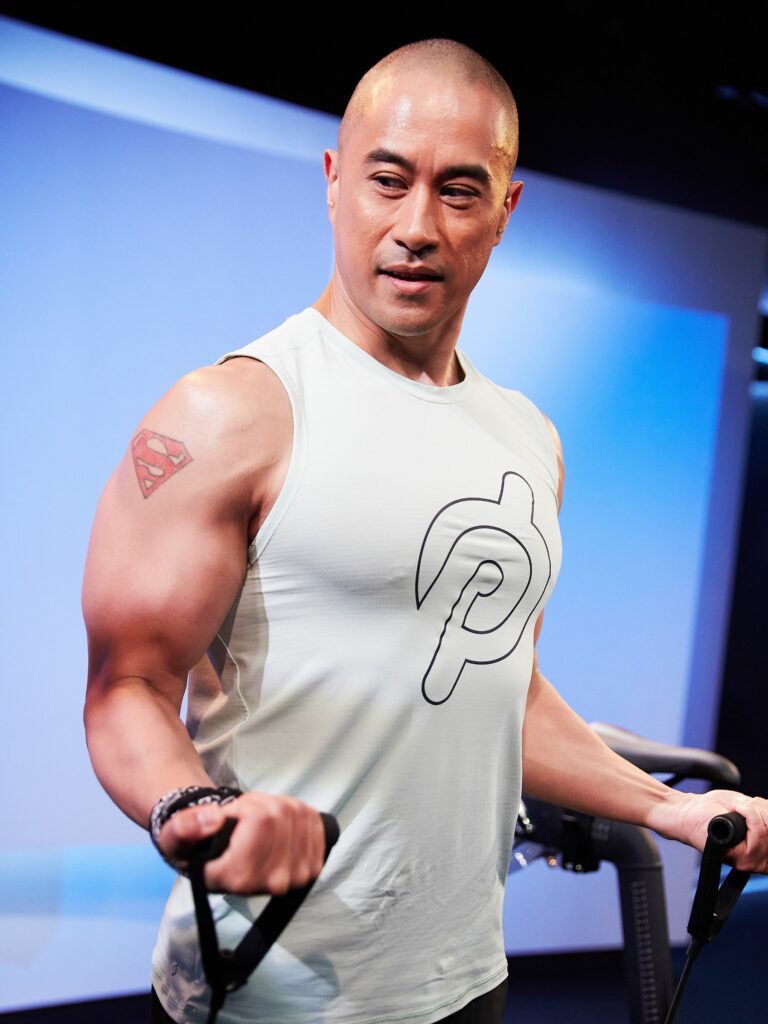Photo: Tony Yeung from Arculon Studios, Courtesy of: ConFit.
Heavy rain is forming loungeroom-sized puddles on the grass in front of the grandstand at Callan Park Oval in Sydney’s Lilyfield, as a group of fitness enthusiasts struggle through a gruelling dawn training session led by Joe Kwon, a former inmate turned PT. Still dark, the grandstand is lit by a spotlight, as Kwon instructs the group to hold a 1-minute plank followed by a wall sit.
“Funny story in ‘juvey’ the other day,” says Kwon, as our quads begin to scream in private agony. “Kid chucked his guts up doing this workout.” It’s not your typical PT banter but then Kwon is hardly your average fitness instructor.
Founder of the social enterprise, CONFIT, an initiative that aims to use fitness to help ex-cons readjust to society after prison, Kwon is dressed head-to-toe in black. Prison tatts catch the eye on the powerfully built 34-year-old’s arms and legs. One in mandarin on his left biceps was inspired by a Chinese man Kwon befriended inside. It says, “Only the strong survive”. It’s the kind of hackneyed aphorism that can ring a little hollow in civilian life or be rendered meaningless in, say, a CrossFit call-to-arms. In prison, though, they’re words you live by. And for a man like Kwon, who’s done hard time and emerged from prison determined to help other ex-cons seize elusive, often grudgingly ceded second chances, they’re words you’ve just got to keep telling yourself.
HIGH TIMES
As the dawn light filtered through the giant windows of the Shangri-la Hotel’s executive suite in Sydney on November 28, 2007, a then 21-year-old Kwon picked up the phone to call room service. Ordering a big breakfast with orange juice, he surveyed the piles of cash spread over the coffee table in front of him, the spoils of the previous night’s drug deal.
Not long after there was a knock on the door. Thinking it was his breakfast Kwon yelled out for the attendant to enter. But when the door swung open Kwon knew instantly he was going to go hungry.
“The door opens and guys in balaclavas holding machine guns are telling me to get the fuck on the floor,” he recalls. “The first thing that came into my mind was, ‘This isn’t the big breakfast I ordered’.”
Turning to run, he tried to kick the cash off the coffee table. “At first, I thought I was getting robbed because these guys were wearing balaclavas, so I’m thinking, ‘Oh, my God, someone’s doing a job on me’.”
As he tried to evade the masked assailants, he was smashed in the head with the back of a machine gun, before being hog-tied on the floor. Then he heard the words, so familiar as to be numbing on cop shows and movies, yet jarringly surreal when you hear them in real life: “You’re under arrest”.
It all happened in a matter of seconds but in the moment, with adrenaline coursing through his veins and later, as he replayed the scene in his mind’s eye, the events played out in slow-motion, says Kwon. “It was like something out of The Sopranos,” he remembers. “I could see the Harbour Bridge out the window. I never realised how beautiful it was until that moment. I’m looking at this view of Sydney and I’m just thinking, ‘Man, this is so beautiful’. That was my last bit of freedom.”

SCHOOL OF HARD KNOCKS
Kwon grew up in Sydney’s Bankstown area, although he and his mum moved around a lot – in one year they moved 12 times. With his dad not around Kwon suffered from abandonment issues and remembers being angry that he and his mum were forced to struggle. “I was known as the angry kid,” he says. “Even the smallest things used to tick me off. I’d always get into fights. That’s how I got the attention of the local street gang.”
Perhaps impressed with his black belt in taekwondo, the gang put Kwon to work. By the time he was in high school he was running drugs. He saw his first murder at an arcade when he was in grade 6.
It was a volatile, cutthroat existence. On multiple occasions Kwon was ambushed, kidnapped and bashed. As time went on, he began to resent being a pawn in a game in which he felt he could be a player. “I’m thinking to myself, “Why am I taking all these risks? Why shouldn’t I just do all this myself?”
He dropped out of school in year 10. In the calculus of the street, it didn’t really add up to spend your time with your head buried in books. “I’m thinking, ‘Why the hell should I be in school educating myself when I could be making more money on the streets?’”
At 19, Kwon started his own drug syndicate, using teenagers to deal ecstasy and MDMA to schoolkids going to parties. Business was good. It wasn’t long before Kwon found himself heading up a multi-million-dollar operation.
But he was still angry, his rage manifesting in a nihilistic embrace of a drug-fuelled, party-hard lifestyle. “I was living large and so very stupid,” he says. “I was still angry, but that anger got channelled into living recklessly.” He remembers waking up one morning in a hotel in Surfers Paradise with no idea how he got there.
It couldn’t last. It wasn’t long afterward that Kwon would wake up in new, less opulent digs, the path that led him there all too apparent.
The three-part docuseries Life on the Outside airs Wednesdays from 16 March at 8:30pm on SBS.
GET BUSY LIVING
Kwon was sentenced to 13 years in prison for directing a criminal enterprise. He would spend time at jails all over NSW but did the majority of his sentence at Long Bay and Lithgow.
Early on inside he yearned for his former life. “On the outside, I had an entourage, I had money, I had a comfortable life,” he says. “I’m thinking I was good at it, so I’m like ‘This is what I’m going to do for the rest of my life’.”
He sought out high-level drug lords, what he calls the “007s” of the drug game. “I wanted to learn from these guys,” he says. But the more he listened to their stories the more a question kept bothering him: “If you guys are so bloody good, why are you in prison?”
He remembers talking to some of the prison guards, who shared with him the common denominator among inmates: lack of education. He began to look around for other options, eventually picking up a copy of Robert Kiyosaki’s finance book, Rich Dad, Poor Dad in the prison library. One sentence leapt out at him. “The language of business is accounting”. He promptly found a first-year university accounting book but when he opened it up the numbers and formulas were “like hieroglyphics”.
What happened next could be called luck, though perhaps you need to be in the right frame of mind to recognise an opportunity when one comes along. One day a white-collar criminal found guilty of tax fraud appeared in the yard. Rumours spread that the guy was an accountant. Some said he was a billionaire. Kwon knew he was his man. “I asked him if he could teach me accounting every night?”
The unlikely pair became fast friends. Later they became cellmates. But the accountant would teach him more than just simple equations, inculcating Kwon with life lessons that underscored the value of education and the importance of having self-worth. “That was the most valuable lesson I learned from him,” Kwon says of the man he’s still friends with today. “I realised I could do something for myself. And that’s all it took, one person to get me to believe in myself.” Prisoner or poet, if you’re able to do that, you free yourself from one of the most oppressive shackles of all.

TRAIN, EAT, REST, REPEAT
As Kwon began to find his feet in the prison system, he noticed that there were three main tribes among inmates: gamblers, junkies and trainers. With his attitude now firmly geared toward bettering himself, he gravitated to the trainers.
“Jail’s about how you spend your time,” he says. “I knew a lot of problems start either because you’ve got a gambling debt or you’ve got a drug debt. That’s where all the fights happen. The guys that were training, though, they all had a positive mindset.”
While he had a martial arts background, Kwon hadn’t really lifted much before prison. In his decade inside he would come across former bodybuilders, amateur boxers and seasoned prisoners, all happy to share their knowledge. “It just gets passed on from the previous generation of inmates,” he says.
Kwon dedicated himself to learning all he could about the body and the way it responds to volume, load, nutrition and rest, even poring over old copies of MH in the prison library. Training in prison, he discovered, was defined by two things: camaraderie and consistency. “You train with the boys. It’s very regimented. Every day at this time, this is when we train, this is what we do. It just becomes a way of life.”
While in movies you might see inmates clanking huge loads on rusted equipment to grinding hip-hop basslines, in reality, Kwon says, you had to improvise. “It’s mostly all body weight, or we had to make weights out of what we had,” he says. “There’s a lot of garbage bags filled with water. We used to do shoulder carries with the heaviest guy you could find in the yard. There’s not much load, but we would do it at high intensity, which meant lots of reps. The intensity of that training is hard.”
Relatively lean when he walked into prison, Kwon began grabbing protein any way he could to bulk up. “Because we don’t get enough [protein] in there, we would just smash six cans of tuna to make our protein count,” he says. “Inmates get so jacked because there’s a lot of calories in our food, like instant noodles. If you’re training twice a day and you’re resting as much as we do – some of the boys sleep 11 hours a day – there’s nothing else to do except train, eat, grow and study.”
But the changes to his body weren’t the only reason Kwon enjoyed training. Even more powerful was that for a few precious moments it took him beyond the walls that enclosed him. “When I trained, it was like my escapism,” he says. “Even though my body was incarcerated, my mind was free.”
A FIT FUTURE
Greasy with sweat I’m struggling to hold a plank in the sauna-like conditions under the grandstand at Callan Park. “If your stomach touches the ground, you know what you’ve got to say to yourself?” Kwon asks the group. “Soft as butter.” Somewhat galvanised, I tighten my core until Kwon calls time, as I imagine a pair of inmates using the line to motivate each other in the yard.
Kwon walked out of prison in November 2017 after serving nine years of his sentence, certain of one thing: he wasn’t going back. Before getting out he’d reached out to a senior lecturer at UNSW, Dr Natalie Oh, who’d previously helped other inmates get into university. With her help he applied to do a Bachelor of Commerce degree, which he will finish later this year.
Upon release Kwon worked to get accredited as a PT, determined to use the purpose and positivity training had instilled in him to help bridge the gap between prison and the community. He started a bootcamp using the routines he’d relied on inside. Then he invited other ex-cons to work alongside him as trainers, founding CONFIT two-and-a-half years ago.
“It’s hard when you try to get a job and you go, ‘Hey, I just came out of jail, I’ve got a criminal record’,” Kwon says. “No-one’s going to hire you. So, I wanted to create a bridge between society and those with lived prison experience, through fitness.”
At first glance there would appear to be parallels between prison-style training and military- inspired routines. Indeed, former ex-servicemen have made names for themselves in the fitness industry by promoting their military background and leaning into the PT-as-drill sergeant trope. But while both forms of training rely heavily on bodyweight routines, the ethos is starkly different, Kwon says. “The military’s all about discipline,” he says. “Inmates, I guess, we were in jail because we didn’t have discipline. What we had to do was create that sense of community in prison. It’s all about community for us.”
With its emphasis on high-intensity, bodyweight training, it’s perhaps not surprising that CONFIT found a new following during ‘lockdown’. “We got the title, ‘Experts in confined space bodyweight training’,” Kwon laughs. “We were running Zoom sessions and people were loving it because it was the exact same routines we were running in our prison cells.”
While perceptions of ex-cons can make attracting clients difficult, Kwon says, those who do show up for a session know what they’re signing up for and are either drawn to the intensity and simplicity of the workouts or just eager to show their support for an initiative geared towards reducing rates of recidivism. In Australia, 54 per cent of released adult prisoners return to prison or community corrections within two years. “I only bring on those who actually want to make that change in their life,” says Kwon, who appears in a new SBS docuseries, Life On the Outside. “We know that housing, community, employment, education and mindset are some of the main factors to address recidivism and this series [Life on the Outside] looks at some of these factors. But none of this matters if the individual is not ready to change. The sad part is for those who really do want to make the change is that support and opportunity is usually not there for them and a lot of people unfortunately spiral back into the system.”
Kwon is determined to use CONFIT to break the cycle and has already seen some positive results. Several former inmates have been able to find work in the fitness industry, he says. Others are involved with an offshoot non-profit initiative Kwon started called CONFIT Pathways, in which ex-cons visit juvenile detention centres across NSW, providing fitness mentoring and mindset programs for young offenders. “A lot of these kids, all they know is gang culture,” he says. “We know that culture very well. What we’re trying to create is a gang that doesn’t do crime.”
There’s one other thing Kwon’s taken from prison and incorporated into his training philosophy and to life on the outside more broadly: a code. “Inmates live by a certain code, which is like the code of silence,” he says. “Your word is your bond. But it doesn’t always lead to positive outcomes.” Instead, he now lives by his own code, inspired by his experiences, called the G Code: gratitude, goal setting, grounded. “In prison we had nothing,” he says. “For us to learn to be grateful for the little things we had really changed our perspective on how we looked at life. Fitness is all about goal setting, always moving forward. And we always tell our clients to be grounded. Just do the best you can in this moment, because you don’t know what’s ahead of you tomorrow.”
The Prison Workout
Kwon and his fellow inmates used to do this session, known as “Pain Storm”, as a group in the yard. “The last person had to do the dishes,” he says. Find a mate or do it solitary on a basketball court or in a park
>25 burpees
Jog up the yard and back
>100 squats
Jog up the yard and back
>100 push-ups
Jog up the yard and back
>Walking lunge up the yard
>Burpee frog-jump up the yard
>Walking lunge up the yard
>100 push-ups
Jog up the yard and back
>100 squats
Jog up the yard and back
>25 burpees
Sprint to the end of the yard!
Continuously move through the whole routine, resting only if you have to.
Kwon appears as a lived-experience contributor in Life On The Outside, a three-part docuseries that follows the journey of four formerly incarcerated people staying in civilian households for the first 100 days of their release. The series airs Wednesdays from March 16 at 8:30pm on SBS. To find out more about CONFIT, go to convictfitness.com.au and confitpathways.org
















